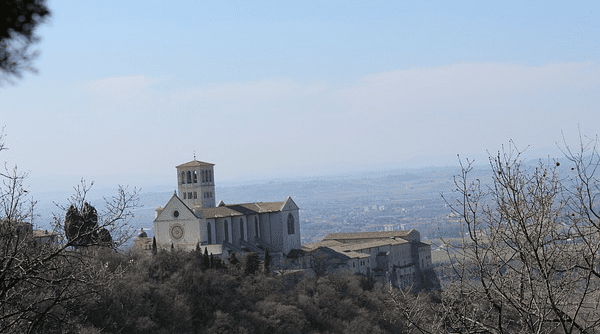Editor’s Note: David Torkington continues his series with a segue into the history of Christian Mystical Tradition, looking now at the centrality of the personal love of Christ in any authentic reform. To read part 32, see here. To begin with part 1, see here.
A Brief History of Christian Mystical Spirituality, Continued
It was thanks to St. Bernard and supremely to St. Francis that the profound mystical spirituality of the early Church was, at least for those with eyes to see, reborn again in thirteenth-century Europe. When St. Francis returned from the Holy Land, he built the first Crib in Greccio to burn into the hearts and minds of his fellow countrymen what had happened at the first Christmas in Bethlehem. In subsequent centuries, inspired by St Francis, the practice of building cribs spread all over Christendom and down to the present day. He wanted this moving scene to do for others what it did for him.
Now that Christ had returned, at least in a way that was not so evident in the Dark Ages for ordinary people, spirituality could return to do what it was originally meant to do. It could teach people once again how to learn to love Jesus so that the love they would receive from him in return would draw them into his glorified body, thence in, with and through him back to the Father.
Francis Receives a Revelation
St. Francis had not only longed for but continually prayed for physical martyrdom to complete the union with Christ that he desired above all else. Instead of red martyrdom, however, he was offered a form of white martyrdom that no one had ever received before. On the fourteenth of September 1224, the feast of the Holy Cross, he received the stigmata on Mount La Verna.
However, lest St. Francis or anyone else for that matter could misunderstand what was about to happen to him, he received a revelation only seconds before he was stigmatized, so that the suffering engendered by this privilege would not be misunderstood. The revelation is told in such a low key way that many people have either failed to notice it, or paid scant attention to what is of utmost importance. It should have been heralded by fanfares from on high and with heavenly choirs hitting thunderous crescendos. The revelation was to proclaim loud and clear the ‘primacy of love’, that would become the heart and soul of Franciscan spirituality as it had been the heart and soul of the God-given spirituality that formed the first Christians. The revelation that he heard from Christ himself was this. ‘It is not by suffering that a person is united with God, but by love’. The love in question was not our love alone, but our love suffused and surcharged by the love that at all times poured out of the Risen Lord. That is, of course, the Holy Spirit, and that is why Francis wanted him to be named as the General of his Order, leading and guiding them from within.
Francis Reverses the Effects of Arianism
At last, thanks to Francis, the effects of Arianism and Macedonianism were destroyed. Jesus was not only back as the Way, the Truth and The Life, but his love, the Holy Spirit, was always there, ready and available to draw us up and into him. We were no longer alone, left to make our own way against all odds, so the heresy of Pelagianism was put to bed as the Holy Spirit moved in to do what was quite impossible without him.
As the Holy Spirit raises a person upward and into Christ, it is to see that all things were created in him from the beginning and that far from being evil, they are all good for they are the work of God. Salvation then does not involve the arduous task of trying to free oneself from a world in which all things are evil and imposing on oneself a form of inhuman ascetism that you find nowhere in the Bible but everywhere where Manicheism abounded. On returning to Assisi after receiving the stigmata, St. Francis, filled with joy, dealt with Manicheism in his own unique way.
Francis Deals with Manicheism
While St. Dominic was trying to put down the latest virulent outbreak of Manicheism in the form of Albigensianism in southern France, Francis was doing the same in Italy. He did not, however, dispute with the heretics like Dominic, nor did he write a theological treatise; he simply wrote a poem. It was the first poem in the Italian language dedicated to Brother Sun, praising God in the glory of his creation. A little feeble one might think—but far from it. The people loved it and learned and recited it, putting it to music. It was a pop-hit composed by the greatest celebrity of the time and while everyone was enjoying it they were being enthralled by the vision of St. Francis and re-educated about the goodness of God and of all his creation. What better way to reach ordinary men and women in the market place, and help put to death a heresy that had been making their lives miserable for centuries?
After asking pardon of his own body for wrongfully mistreating it, he stood up at the general chapter to condemn all forms of asceticism that came, not from the Gospels, but from the scourge of Manicheism that had for centuries been plaguing the Church and most particularly those who believed that subjugating the body was the only way to free the soul from its imprisonment here on earth. The terrible winter of misunderstandings, misapprehensions, and mistakes was over.
Franciscan Poverty
The Franciscan Spring had arrived, and it was inaugurated by a man who chose to be stripped of everything to imitate the poverty of Brother Jesus. Many, including some his first brothers, misinterpreted the reason why he wanted to be so absolutely poor, arguing that it was not a virtue that Jesus and his disciples embraced—but they missed the point. The absolute poverty of Christ that Francis wished to emulate was the poverty into which Jesus entered when he cast aside the riches of glory in heaven to enter into a weak human nature and subject himself to arrogant human nobodies for us. But the ultimate in poverty for Francis was Christ’s decision to continue to humble himself daily to become ordinary homemade bread. Why? So he could enter into our very bodies and there, radiant with the love that he first unleashed on the first Pentecost day, fill every part of our bodies so that we can be taken up into his mystical body where we can contemplate the Father in, with and through him, to all eternity. After he received the stigmata he received a special indult from Rome giving him permission to have Mass in his hermitage. His joy was now complete.
The Primacy of Love in Practice
It may sound fine to proclaim a new age in which the primacy of love was to be paramount, as it was in the beginning. But it must not be forgotten that the love Francis was talking about was God’s love, the love that can change all things including us. However, as love cannot be forced, only given, to those who freely choose to receive it, Francis acted accordingly. He did what was to him so obvious, but which might not ever occur to us. He went into solitude with ever-increasing regularity and for ever longer periods of time. When you believe that the love that made the world is there ready to make us into the image and likeness of his Son and fill you with the joy that nothing else on earth can give you, it seems the obvious thing to do; not to us perhaps, but it did to Francis.
As long as the contemplation that St. Francis experienced in his prayer life also animated and inspired those who followed him, all would be well. They would not only see the truth with the wisdom that inspired him to show them what to do, but they would be given the power to do it. But take contemplation away and decline and fall would set in until contemplation returned.
St Thomas Aquinas defined prayer, and he also defined meditation. He did not say pray, or meditate, and share the fruits of your prayer or meditation with others. He said contemplate and share the fruits of your contemplation with others.
Introducing St. Bernadine of Siena
While the Black death in 1349 killed almost half the population of Europe, far more were killed in religious orders because their charity opened them to the pestilence far more than the population at large. This led to religious decline, as in order to maintain all the religious houses that were rapidly emptying due to the plague, all too many new recruits were hastily signed up who were not suitable candidates for contemplation. As a result, decline set in across the board in almost all religious communities. The only hope was, ‘back to contemplation’ and after seventeen years in solitude where he practiced the contemplation that was to be his mainstay for the rest of his life, St. Bernadine of Siena was the man who set out sharing the fruits of contemplation with others. The new Franciscan reform which he represented was inundated with new recruits.
Next time you are in Franciscan Italy, visit the remote hermitages where St. Francis sought solitude. There you will see the caves that he used, and even huts still standing made of wattle and daub. But then you will see the many hermitages still in use today all built by St. Bernadine to accommodate the new members of his reform who stayed there for years, learning to meditate and then contemplate in preparation for the massive spiritual reform they would bring not just to Italy but to Germany, France, and Spain in the fourteenth century. All this was now possible because the Christ who disappeared from view in the Dark Ages had been reborn, thanks to St. Bernard and St. Francis.
The primacy of love would become central to the mystical theology of the Franciscan theologian Blessed John Duns Scotus and to the reforms of St. Bonaventure, St. Bernadine of Siena and the other reformers in the years ahead. It was not just the person of Jesus, but his personal love that would henceforth be central to all genuine reforms. It is only when his love is suffused with our own, that together we can contemplate the glory of God, as God intended from the beginning.
Image of Assisi, Pixabay




